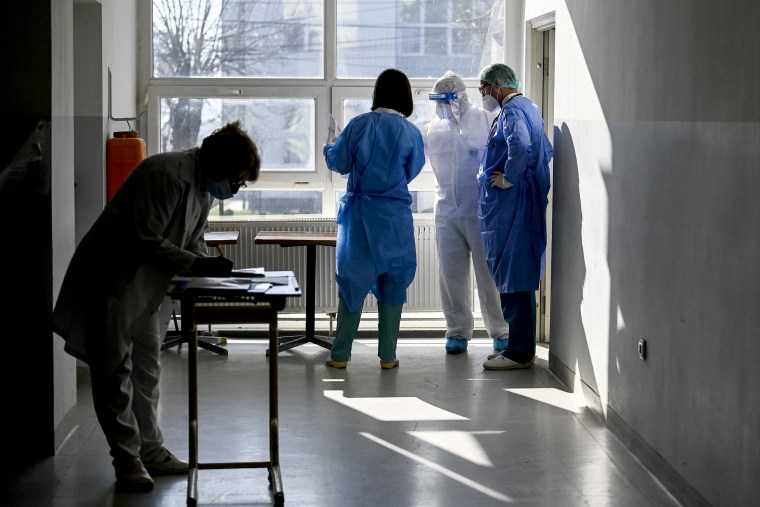A U.S. ambassador is providing a snapshot into the mounting mental health crisis faced by U.S. diplomats serving in hardship posts overseas during the Covid-19 pandemic as the State Department struggles to inoculate a workforce of tens of thousands dispersed around the globe with limited doses of the vaccine.
The Feb. 15 cable, written by U.S. Ambassador to Kosovo Philip S. Kosnett and obtained by NBC News, details the burnout, isolation and mental health challenges for those serving in one of Europe’s poorest countries. It also provides insight into the greater challenges faced by many State Department employees abroad.
The message sent agency-wide included a plea to Washington to do more to help a “community nearing the breaking point after 11 months sheltering from a pandemic which has ravaged this underdeveloped Balkan country.” The memo was first reported by Politico.
“Persistent anxiety — for some community members, fear — punctuates an existence of isolation, separation, and diminishing hope. Post leadership can and must do more locally to address morale issues,” Kosnett said. “Until the Department is able to provide vaccine to posts like Pristina, the impact of the pandemic on health, welfare, and productivity will remain profound."
The U.S. diplomatic agency has received just 23 percent of the doses needed to vaccinate their entire workforce including family members, interagency partners, contractors and local staff, a State Department spokesperson told NBC News.
“If the Department continues to receive only partial allotments, we will make decisions based on the data while taking into account complex logistical considerations,” the State Department spokesperson said, citing factors including the disease burden, positive case count and quality of healthcare in any given location.
The limited vaccine supply has left some diplomats feeling the agency prioritized their domestic employees over those serving abroad. According to the State Department spokesperson, though, nearly 80 percent of the vaccine received so far had been directed to posts in the field.
Pristina, the capital city where Kosnett is stationed, suffers from a weak system of medical care, hazardous levels of pollution and notoriously unreliable internet, he said.
“Everyone came to Pristina aware that it was a hardship post, but nobody expected it to be a tour of isolation, and of separation from friends and family,” Kosnett wrote. “Recognition that the pandemic has affected people globally doesn’t reduce the psychological impact locally.”
Download the NBC News app for breaking news and politics
Overworked, understaffed and faced with conditions that leave employees feeling unsafe to leave their homes for basic necessities like groceries, the cable describes how some Americans at the U.S. mission in Kosovo see the current state of affairs as simply unsustainable. One person described their experience over the past year as treading water and wondering when the lifeboats would come.
While Kosnett expressed appreciation for the State Department’s "commitment to transparency as it makes tough choices about how to prioritize limited resources," he stressed the importance of looking beyond the numbers.
"This is a human tragedy, the scope of which cannot be fully appreciated without considering the holistic effect on our lives," he wrote of the impact of the Covid-19 pandemic on his own staff. "It’s not simply a series of binary questions: infected, or not; hospitalized, or not; dead, or not. A qualitative perspective of the pandemic is essential."

